Last Friday evening it became known that Nader Talebzadeh, chief propagandist to the Islamic Republic, had died in Tehran aged 69. Though Iranian state media described him as a “documentary maker”, the vast funeral procession – and the fact that President Ebrahim Raisi himself recited the fatiha, a verse of the Quran, over Talebzadeh’s body, not to mention the message of condolence from the Supreme Leader – told a different story. In fact, Talebzadeh had enjoyed a decades-long, largely undocumented and hugely expensive career laying the foundations of Tehran’s contemporary propaganda drives, from the IRIB to foreign-language media outlets and conferences abroad.
Catherine Perez-Shakhdam is a political analyst and commentator, a former consultant for the UNSC on Yemen's War Economy director of Yemen's Unit for the Next Century Foundation, and a journalist whose work has been published by BBC Arabic and Persian, the Huffington Post, and The Times of Israel. She came to know Talebzadeh in the final decade of his life as a rare, trusted Westerner in Tehran. Here she shares her personal recollections of a man who, as she sees it, shaped the way the world regards Tehran today – but also how Tehran conceives of the world.
***
Hailed as one of Iran’s brightest and most accomplished filmmakers, Nader Talebzadeh’s career, on the face of it, was paper-thin – at least as far his filmography was concerned. With only one real feature film to his name, The Messiah, which offers an Islamic take on Jesus of Nazareth, Nader’s efforts were clearly being expended elsewhere. And yet, it is his role as a film director and TV presenter the Islamic Republic has been so keen on pushing.
Then again, as it is often the case in Iran, the hand which holds the pen – or in this case controls the keyboard – will eventually have the final say on what truths will be served to the people, so history will fit the regime’s narrative.
The real history is this. On April 29, the Islamic Republic of Iran lost a man who, from its very inception, had helped shape and project state narratives beyond Iran’s borders. Nader was instrumental in realizing the Ayatollahs’ hegemonic aspirations by enticing intellectuals from across the world to the “cause”.
Nader was a powerhouse within the Islamic regime. He hailed from an affluent family whose fortune was built under the Shah before the 1979 Islamic Revolution. His father had been a Shah-era military man, a stain the Islamic Republic’s chief propagandist would later spend decades trying to wash away, without finding true redemption in the eyes of the hardliners. Nader’s inability to atone for the perceived “sins of the father” speaks volumes as to the nature of the Iranian regime today, and of its fascistic ideology that demands its followers constantly prove their loyalty just to appease the Leadership’s paranoia.
Despite this, Nader’s rise to fame in Tehran’s corridors of power was by all accounts dizzying. A friend to the Supreme Leader, Ayatollah Ali Khamenei and a close advisor to now-President Ebrahim Raisi, he worked tirelessly to expand the echo chambers of the regime’s ideology so its language could be normalized, and new agents forever recruited.
I have personally borne witness to Nader Talebzadeh’s influence over even Sepah, aka the Islamic Revolutionary Guard Corps or IRGC, when he bypassed all the rules and regulations to secure my own interview with Raisi in 2017.
Impervious to the IRGC
The IRGC exists outside the influence of all Islamic Republic state institutions; its tentacular network oversees and controls all that is within Iran, as well as acting to realize Tehran’s regional ambitions abroad.
More powerful than Iran’s appointed state officials, the IRGC has moved from its purely military role in 1979 to exerting influence over every aspect of Iranian society. It most dramatically expanded its social, political, military and economic footing during the Ahmadinejad administration from 2005 to 2013, as observed during the 2009 presidential election and post-election suppression of protests, leading many to argue that its political power had surpassed even that of the country's Shia clerical caste.
The IRGC’s increased influence needs to be understood as a direct consequence of Ayatollah Khamenei’s lack of a natural constituency when he was selected as successor to Ruhollah Khomeini in 1989. Ruhollah Khomeini was a Grand Ayatollah, a Marja, an Object of emulation for millions of Shias when he came to power. But Khamenei was a junior cleric who was not even an Ayatollah when he became the Supreme Leader.
Khamenei cleverly forged a tight, symbiotic relationship with the IRGC. Since 1989, the IRGC has become not only Iran’s biggest military force but also an industrial and commercial behemoth with its own universities, hospitals and a powerful intelligence forces. It has vigorously supported Khamenei’s domestic policies and his regional and international inspirations. In the past three decades the Quds Force, the IRGC’s extraterritorial arm, has become the most important part of the Corps.
Most Iranians, even regime insiders, shudder when they hear the word Sepah. But Nader was different. He had great influence over the IRGC in that he had long asserted his ability to craft Iran’s revolutionary doctrine, which became the common ideological denominator to the many groups, organizations, and media outlets Tehran developed over the years to export its model of governance. Though he is often referred to as a renowned filmmaker and intellectual, Nader’s true function was propagandist-in-chief, someone who articulated the IRGC’s raison d’etre for itself and the rest of the world.
Through all the millions of dollars the Islamic Republic spent over the years supporting terrorist organizations in the region and around the world, Nader stood as one of the brains behind its propaganda machine, an advisor few would ever dismiss. Such was his ability to construct media networks and curate relations with foreign actors deep within the hearts of even our Western secular democracies. The networks included PressTV, the regime’s English mouthpiece, HispanTV, the Spanish channel, and hundreds if not thousands of websites and trolls.
It should come as no surprise today that some Western politicians still try to find “pragmatic” partners in Iran to reach a deal with. If not for the efforts of Nader Talebzadeh, it is unlikely the West would have bought into the ridiculous notion that Tehran’s autocratic regime could be looked upon as a genuine partner in peace, let alone a regional agent of stability.
Fomenting Anti-Jewish Hatred in Iran and Abroad
Nader’s critics within the regime spread the rumor that he came from a Jewish family. True or not, Nader was and will forever remain the chief architect of Tehran’s antisemitic and anti-Israel propaganda. Over the decades, his main efforts were concentrated on disseminating the idea that Israel, and by extension all Jews, posed the biggest threat to global security.
This was a “threat” that he held must be eliminated. He stood behind Iran’s infamous Palestine Project, a conference promoting antisemitism as accepted political thinking – itself ironically on behalf of the Islamic Republic, a movement that thrives on nihilistic imperialism.
Countless Western thinkers have fallen prey to Nader’s hypnotic charisma, paying lip service to a regime that hid its genocidal ambitions behind grand claims of intellectual liberation and progressive liberal values. Nader’s friendships with personalities such as Oliver Stone, who attended the 36th Fajr International Film Festival in late April 2018, are testimony to his influence overseas.
In a televised interview in Tehran, Stone asserted: “America combined with ISIS and Israel aims to destroy the Middle East and make it a parking lot for America, to make it over, and I think it is a very destructive plan and it is a tragedy”. These words were a direct result of Nader’s ability to project and translate Iran’s revolutionary ideology for foreign audiences.
Tehran’s supposedly anti-Zionist stance and the weaponization of the Palestinian cause, as promoted by Nader, allowed for the language of the Islamic Republic to Western borders and pollute the minds of even state representatives. He told me that it was he who, for instance, facilitated US Senator Dick Black’s meeting in Damascus with President Bashar al-Assad, and influenced – through the placement of advisors – the softer political stance in the Middle East of Congresswoman Tulsi Gabbard.
Closer to home, from Beirut to Damascus, Baghdad and to some extent Yemen, Talebzadeh endeared himself to countless leaders and well-known terror proponents – including the leadership of Hamas, the Houthis and the Taliban. He was a master manipulator of narrative and a force unto himself. He could commandeer the attention of some of the world’s most radical ideologues, then rally them under the flag of the Ayatollahs, making Tehran’s worldview a political point of reference.
A Khomeinist From the Start
For as long as the Islamic Republic has blotted the skies over Iran, Nader Talebzadeh’s name has been synonymous with Velayat-e Faqih, or Guardianship of the Islamic Jurist: the official system of governance established by Ayatollah Ruhollah Khomeini in 1979.
His relationship with the Islamic Revolution was forged, like that of many others, on the return of the Ayatollah: the leader of a movement that would precipitate the fall of the Shah and push Iran into the arms of a system that ultimately made of itself a theocracy, all the while brandishing a republican flag.
Born in 1953 into an affluent family loyal to the monarchy that had allowed it to prosper, Nader travelled to America at the age of 16 to continue his film studies at Columbia University, one of the most prestigious and expensive institutions in the country.
He returned to Iran on the eve of the Islamic Revolution in February 1979, keen to lend his camera to Khomeini’s political experiment. Thus was born a career that saw him climbed the echelons of power, so much so that he called some of Iran’s most prominent figures friends, unburdened of the many limitations others had to face.
Based on my conversations with him I believe Nader was instrumental to the consolidation of Ayatollah Khomeini’s power. He developed the very structures that would allow Khomeinism to not only survive a brutal war with Iraq (1980-88), but to flourish through extensive networks of foreign alliances. The media was to become both shield and weapon to rally support and promote first Ayatollah Khomeini’s agenda, then Ali Khamenei’s political vision.
Within 10 days of the overthrow of the Shah, Nader set up the regime’s new foreign-facing media arm in the form of the Tehran Times, which became the cornerstone of a sprawling network that has since echoed the regime’s voice and offered the world the appearance of consensus as to the Islamic Republic’s legitimacy. It was Nader Talebzadeh’s influence that made it possible for Tehran to project itself so far beyond its borders.
The (Russia-Infatuated) Man Behind the Propagandist
I first came to know Nader in 2017 when he invited me to a conference, New Horizon, co-hosted by his organization and the Iranian parliament to promote the Palestinian cause. I quickly came to realize the event was an exercise in propaganda, hosting the heads of countless terror groups all bent on annihilating the state of Israel. From Hezbollah to Hamas and other proponents of Iran’s vengeful antisemitic ideology, a who’s who of Islamic fundamentalists had gathered in the grand hall of Tehran’s conference center to discuss Israel’s downfall.
Our first meeting was over a cappuccino in Tehran. Our friendship would span several years (more on how this happened to follow). It was during this period that I would come to learn of the man behind the propagandist.
It was then that I fully came to appreciate the extent of his influence, and the ties he held with those, who, from behind the curtain, have pulled Iran’s strings, fomenting the chaos they needed to encroach themselves onto a region which otherwise would have remained closed off to their influence.
In fact, it is toward Nader’s deep ties with Russia that we ought to turn to fully appreciate the nature of Nader’s trajectory in recent years. Russia was the influence that ultimately shaped and motivated his political trajectory.
A close friend of Alexander Dugin, the Russian political philosopher and “brain” behind Vladimir Putin’s hyper-imperial nationalism, Nader often acted as Dugin’s proxy in Iran’s sphere of influence: mainly Iraq, Iraqi Kurdistan, Syria and of course Lebanon.
But which of the two was leading, and which acted as faithful disciple?
It was evident from my conversations with Nader, and his vision for the Middle East, that Dugin was more than just a friend; rather, he was a mentor. Dugin’s call for nations to band together against modernity, the Western democratic model and what he describes as the “Atlantic, capitalist and liberal hegemony” – to fight back through revolutions – echoed all too much of Ayatollah Khomeini’s own rhetoric, and that carried by Nader Talebzadeh through the years, for any of us to ignore.
Nader’s efforts to align Shia Islamic philosophy and its own brand of esoterism with that of Russian orthodoxy were also proof in my eyes that he regarded the Islamic Revolution as an expression of Russian philosophical thought – as if the two could eventually be combined, with Iran absorbed into Russia’s budding empire alongside other members of the so-called Shia “Axis of Resistance”.
I met Dugin in November 2017 as he was on his way to Karbala in Iraq, on Nader’s invitation. If our interactions were brief, they nevertheless left a lasting impression. From Nader’s reverence to the man, it became evident to me that Dugin was there more to direct and curate ties with the Iraqi clergy through Nader’s patronage, less to learn about Imam Hussain’s martyrdom.
Experts have seldom weighed on Russia’s close links to the Islamic Republic. Fewer have acknowledged that such an alliance could in fact not be the result of a push against Western interventionism in the region, but instead be the development of a plan aimed at reinventing the region in the colors of Russian imperialism.
Within this optic it should come to no surprise that Iran’s chief propagandist would hold such friendships. Never mind the work he helped achieve by way of promoting and organizing terror in the Middle East, shadowing Moscow’s ever-expanding footprint in the region.
Ghasem Soleimani’s Counterpart and Friend
Talebzadeh and General Ghasem Soleimani, the late commander of the IRGC’s Quds Force, were long-time friends, and two sides of the same coin. Over the decades, Talebzadeh would prove as instrumental to the regime as his comrade-in-arms. Though both agents of the regime have now passed away, their legacy of blood and oppression will echo forever.
The pair mostly moved in different circles, one the weaponized arm of the regime, the other its grand advocate, but their collaboration resulted in the establishment of a terror network extending far beyond Iran’s borders: as cohesive, well-thought-out, colonial architecture of political control.
Both Soleimani and Talebzadeh curated ties with some of the most infamous figures of the Arab world, encouraging factions to abide by Tehran’s will to foment chaos and insecurity. But Talebzadeh was his still own man. In September 2019, at Moscow’s request, Nader held another New Horizon conference in Beirut mere months after the US added his name and that of three contacts, including his wife, to the sanctions list.
After Soleimani’s assassination in early 2020, Talebzadeh spoke openly about the role he and his agents had played in murdering US troops in Iraq: “Who made so much trouble for them [American troops]? It was the same commander of shadows.
“Who trained [the regime’s terrorist proxy groups] and used the tactic of using roadside bombs, who were like stones? The Americans called these bombs IEDs. I remember how disturbed they were… Who disturbed them? Who’s idea was it? One day we should make films about it, and all the other work he [Soleimani] carried out. This was one of his little initiatives to make Iraq unsafe for the Americans.”
The Man Behind the Mask
Nader was a rather complicated man, I found. I don’t believe that too many can say they shared a friendship with Tehran’s chief propagandist, so guarded he was over both his personal life and intimate political thoughts – that is, apart from the thoughts that aligned with regime orthodoxy.
If Nader held tremendous influence in Iran, he did not escape the entourage that seems to accompany the regime’s men: a form of assurance, I suppose, that they won’t overstep the mark. Wherever Nader went, so did several Basijis.
Needless to say, this perpetual audience to our exchanges did not necessarily allow for honest conversation, insofar at least as one could candidly express one’s thoughts anywhere under the prying eyes and ears of a regime whose paranoia has been a hallmark of its fascism.
And yet, over the years and during the travels I embarked on with him, I managed to catch a few glimpses of the man behind the mask he held so very tightly to his public face. If I’m certain of anything, it is that Nader’s true nature extended far beyond the persona he had built for himself within the regime.
Fiercely Guarded in Conversation and at Home
A very private person who held his cards close to his chest, Nader was more in the habit of asking questions than answering them. The time I spent with him and his wife, away from the bustle of politics, permitted me to gaze at the person beyond the propagandist.
Though it wasn’t often he ever truly let go. In more ways than one he was the ultimate mouthpiece of the regime: the smiling figure who, with a whisper, could have someone else’s properties seized and their lives forfeited to Iran’s brutal judicial system.
Nader lived with his second wife, Zainab Mehanna, a Lebanese woman who came into his life in the wake of a rather tumultuous divorce from an Iranian businessman with whom she had a daughter. Zainab was his partner: both a constant companion at work and a trusted advisor.
Nader seldom spoke of his first wife, an Iranian woman, and less so of his own children, with whom he had a tenuous relationship. On that aspect of his life he remained determinedly tight-lipped.
His relationship with Zainab was an interesting one. While he absolutely relied on her to arrange for his day-to-day affairs – from the coordination of his meetings to the managing of his timetable to, of course, the running of the household, he was intent on keeping her hidden in the background: an extension of his own persona. A caring husband on the surface, he was also very controlling and at times fiercely jealous.
I recall an incident in Karbala where he demanded Zainab keep to a very strict dress code as he felt her chador was not conservative enough, asking even that she refrain from leaving his side, and keep to her room in her free time. If, as I truly believe, he held his wife in the highest esteem, he also very much looked down on her desire for independence, often putting her down if he felt she had spoken out of turn.
Our Strange Friendship
Our friendship was an anomaly. In hindsight I feel his kindness and tremendous help in supporting my rise within Iran’s media and political circles was motivated by the desire to turn me into yet another mouthpiece of the regime and utilize my access to both Western circles and Yemen’s closed-off political elite.
My expertise on Yemen was of great interest to him, and of course to the regime. While Tehran had built bridges with the Houthis, and other actors in Yemen, the Leadership’s ability to exert control there was limited: a reality Nader believed I could help mitigate by acting as a go-between between those two worlds.
Our conversations would always go back to the subject of Yemen, as he asked me to expand on certain key figures’ personalities and political thought, looking, I believe, for pressure points and potential ideological common ground.
I must say that my experience of Nader was always positive, in the sense that he was kind - so much so, in fact, that he allowed me to stay at his home in Qom for a few days, arranging even for a taxi to take me there, while he stayed back in Tehran.
Looking back, I realize just how privileged I was, and how very peculiar our friendship may have looked to those who knew him best. Nader was not exactly an easy man to reach, let alone a man with much free time. And yet he always made sure, whenever I was in Iran, to meet with me and accompany me on my outings. He would encourage me to read some revolutionary literature and even asked me to write books - all on the role of the Israeli lobby in the EU and Britain, a subject he was obsessed with.
He also wanted me to help shape a “new media narrative” for Western consumption that would allow for the transferal of the Islamic Revolution’s principles to Western audiences, to convince all readers of its validity and necessity. Those projects never came to fruition as I had no intention of being party to them.
Nader’s trust towards me was a direct result of my usefulness. He believed my pen and connections within the Arab world, and to an extent in the West, held power. This was made clear to me when he personally intervened after IRGC officers objected to my planned interview with Ebrahim Raisi.
Sitting across from an IRGC official in one of the Tehran media offices, he insisted no vetting process was necessary; that he would act as guarantor for my good conduct. That conversation lasted no more than 15 minutes: quite a feat, considering the red tape usually involved in arranging an interview that high-profile. What should have taken months of planning required no more than a few minutes of heated conversation.
It was the only time I truly witnessed the power Nader held in his hands. His tone, which I’d known to always be kind and generous, turned harsh and aggressive. He was not a man anyone said no to, let alone challenge.
Lost in the Ideological Maze
I also believe the years spent drafting the Ayatollahs’ perverse politics took their toll on Nader. He was so used to weaving fictitious realities and playing to the deep mistrust most of the regime’s men hold toward one another, and the rest of the world, he could at times lose his grasp on what was and what wasn’t.
I often saw cracks in his psyche, windows onto the dissolution of his mental state as he gave in to paranoid delusions. This is not to say the man was crazy. He was not. Only that his years in the service of Tehran’s propaganda machine affected his ability to recognize facts, and to distinguish truths from lies.
Nader’s chats with me, beyond the usual banalities and Yemen, often centered around two things: a) his belief that the Islamic Revolution was a direct expression of Imam Hussain’s socio-political thought and that Ayatollah Khomeini, his descendant, had been assigned the task of liberating the Muslim world and asserting Tehran as its new center of gravity; and b) his assertion that both America and Israel were the villains in our collective story.
He once explained to me how Zionism, as a movement, sought to “destroy Islam” as it saw in the Quran the negation of its own “false religion”: an affront he believed ought to be addressed with utmost faith and, if necessary, violence. His manner was never violent, but his words were incendiary. Jews, he told me over and over, were a plague on humanity that only Islam and Islamic rule could adequately contain.
By Islam, Nader of course meant Shia Islam. Saudi Arabia and the Western world, he believed, were beholden to the Zionist agenda: a false reality he had dedicated his life to unravelling so that other nations could be freed, and then pledge themselves to Ayatollah Khomeini’s vision. Only in Velayat-e Faqih, he argued, could nations experience true peace and contentment.
Any challenge to his fundamentalism would be met with threats of repercussions. Any argument that nations had the right to espouse whichever faith they saw fit, Nader would respond to by retorting that such was the power of Zionism in fooling humanity. Few around him dared disagree and I knew better than to argue, so I listened, and allowed him to elaborate.
Nader’s language was often disjointed, peppered with references to esoterism and Islamic mysticism, making connections where none existed as he strained to rewrite the world to fit his belief system. This was often achieved through negation of the historical facts, such as the Holocaust.
Interestingly in his twilight years, Nader himself was somewhat critical of the regime. He felt Ali Khamenei had failed to adequately surround himself with true loyalists and instead paid lip service to men whose ambitions were not to serve, but to benefit from the Islamic Republic’s wealth. At the same time Nader cared little for the economic plight of regular Iranians. As far as he was concerned, people ought to learn to accept their fate and stand strong in the belief that their “sacrifice” was a necessity that would ultimately expunge their sins.
There was a radicalism to Nader that sometimes pierced through the facade of his generous smile. His demand for absolute obedience was non-negotiable, not only on the part of his wife. This also extended to his entourage and friendships; one had to absolutely revere his views in order to not be labeled a dissident voice. Despite being a man who was educated in the West, his intellectual narrative was based on the notion of subservience: of women to men, people to the Leadership, the world at large to Shia Islam.
As the regime is bidding farewell to its chief propagandist, his legacy – at least, what is known of it – should be a reminder that the real men of power, him included, have been left practically undisturbed as they played to the pain and suffering of millions of innocents, weaponizing religious fascism, all to better consolidate power within the hands of an elite claiming its agenda to be holy.
visit the accountability section
In this section of Iran Wire, you can contact the officials and launch your campaign for various problems




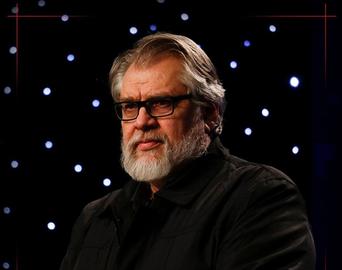
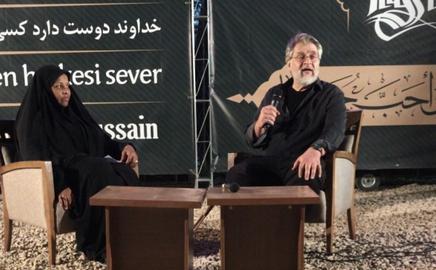
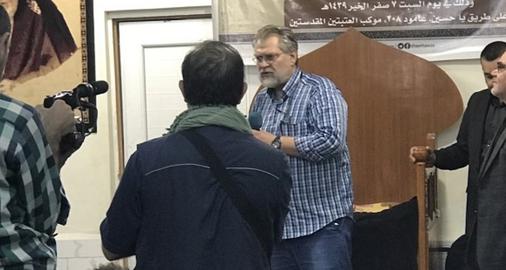
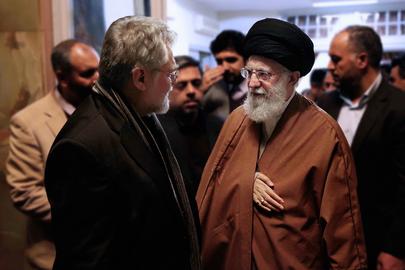
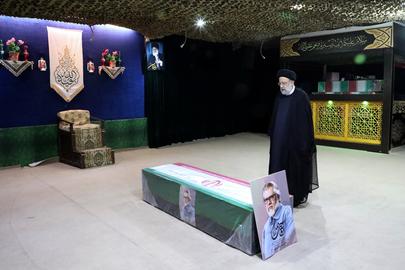
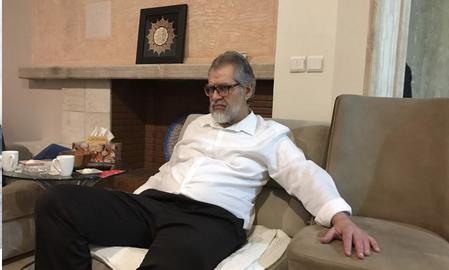

















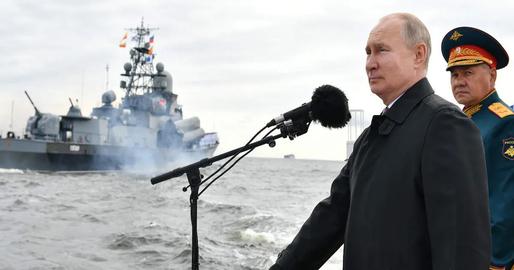
comments